 David Cote
David Cote
All in the family: a PhD student visits India to film a documentary about queer life in Shayok Misha Chowdhury’s vibrant and charming debut play.
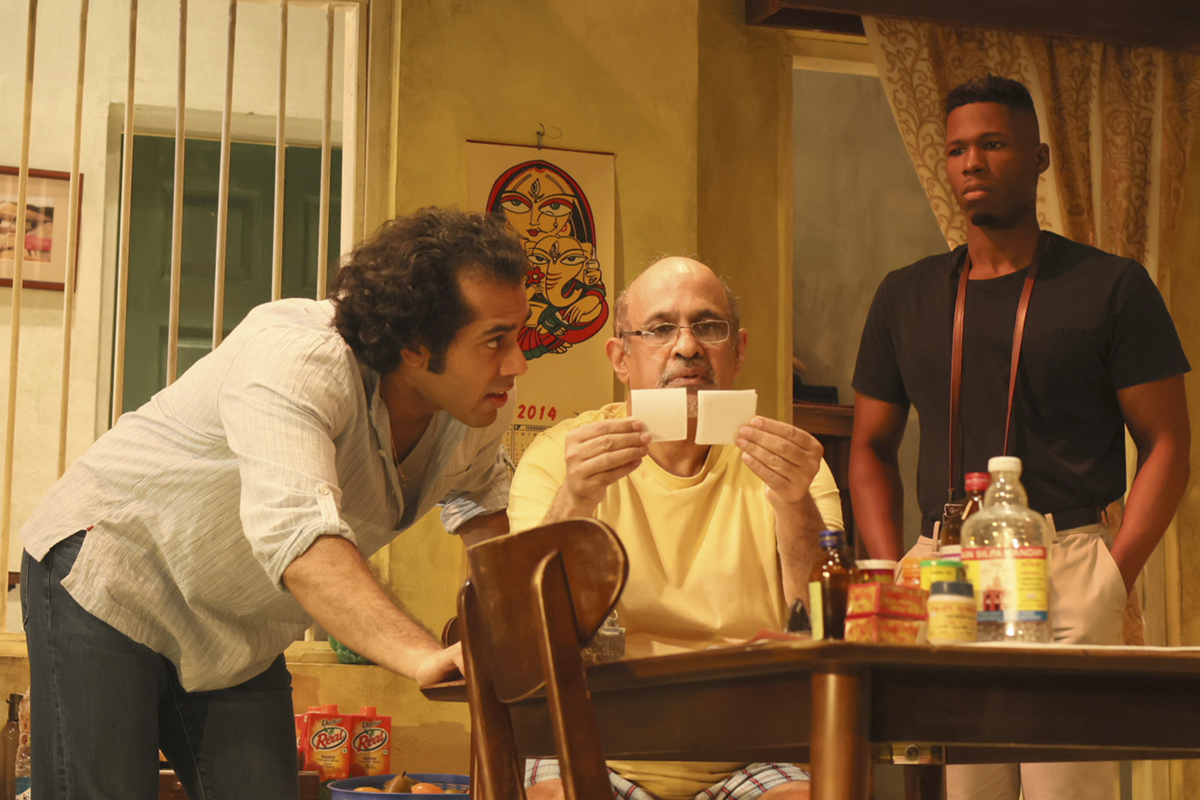
Abrar Haque as Choton, Debashis Roy Chowdhury as Pishe, and Jakeem Dante Powell as Raheem in Public Obscenities. Photo: Hollis King.
Public Obscenities, written and directed by Shayok Misha Chowdhury, Theatre for a New Audience, 262 Ashland Place, Brooklyn,
through February 25, 2024
• • •
The word homely occurs twice in Public Obscenities, writer-director Shayok Misha Chowdhury’s magnificent debut, now remounted at Theatre for a New Audience (copresented with Woolly Mammoth Theatre) a year after its premiere at Soho Rep. In this high-definition portrait of a Bengali American PhD student who visits his uncle and aunt in Kolkata to work on a documentary about queer life in India with his boyfriend-cinematographer, nothing is random. A meticulous thematic patterning churns under the bilingual play’s granular realism. “Homely” is how the uncle, flirting online with a divorced mother in Minnesota, describes women who’ve had children; it’s his clumsy way to praise her looks. Later, the aunt, bidding farewell to her nephew, caresses the boyfriend’s cheek and calls him “homely.” It means, she says, “just like a member of our home.” This semantic doubleness, unloveliness and belonging, is key to Chowdhury’s affecting study of the ambivalent intercultural subject, and how the self sees itself and is seen through a variety of screens.
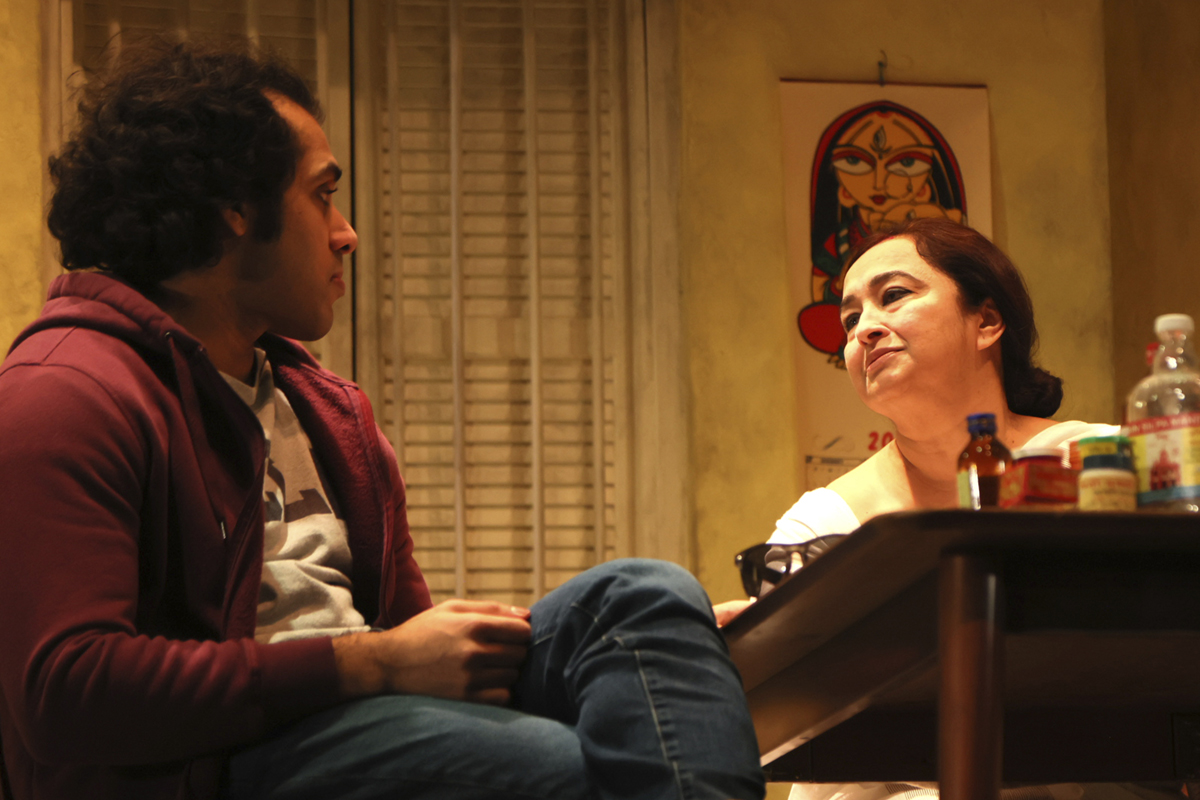
Abrar Haque as Choton and Gargi Mukherjee as Pishimoni in Public Obscenities. Photo: Hollis King.
In fact, what first welcomes the eye is a screen. A fabric scrim, on which movies and text appear, covers the apartment of Pishimoni (Gargi Mukherjee) and her husband, Pishe (Debashis Roy Chowdhury), where nephew Choton (Abrar Haque) and boyfriend Raheem (Jakeem Dante Powell) are staying during their trip. Peiyi Wong’s scenic design of a scruffy but cheerful and light-filled duplex resembles the one from the smaller Soho Rep (by the dots collective), as both sets are based on the author’s family home in India. A brief filmed prologue dollies along the busy streets of Kolkata as bold, jumbo credits in Bangla and English trumpet the play’s title and cast members with a wink (home movies via Bollywood). The camera leads us to a building, down an alleyway, up a flight of stairs, and, as the membrane lifts away, into the home, where most of the action takes place.
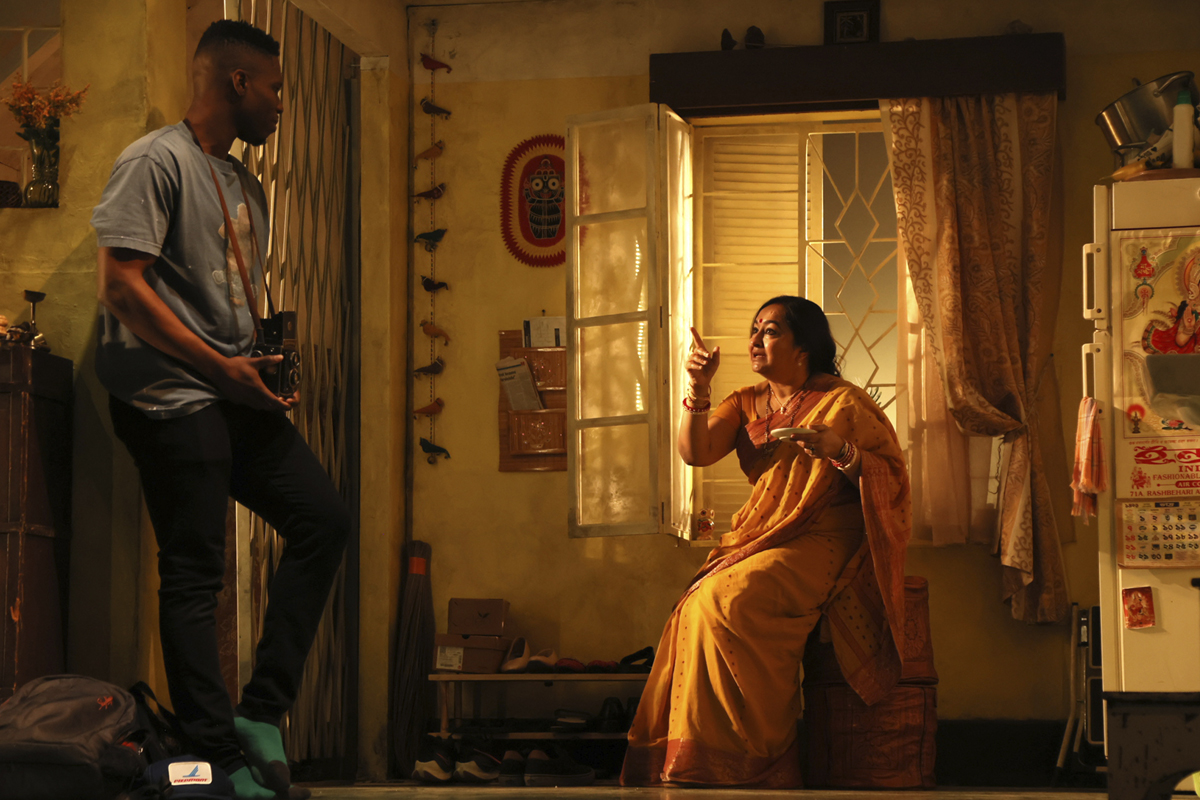
Jakeem Dante Powell as Raheem and Gargi Mukherjee as Pishimoni in Public Obscenities. Photo: Hollis King.
The garrulous Pishimoni feeds newly arrived Choton with motherly care, inquiring (a tad awkwardly) about where Raheem (who’s Black) and his family are from—the sort of question clueless whites might ask. (Colorism is acknowledged but not dwelled upon.) Conversation flows between English and Bangla, with Choton translating for Raheem and Pishimoni gamely participating in her broken English. Facing the dining area is the barred window to an office where Pishe, somewhat a prisoner in marriage, taps at his computer all day: online pool and increasingly racy DMs with the lady in Saint Paul. When the unemployed and slightly boorish uncle-in-law emerges from his man cave in boxers and flip-flops, it’s a gentle sight gag; Chowdhury pushes neither comedy nor domestic conflict too aggressively.
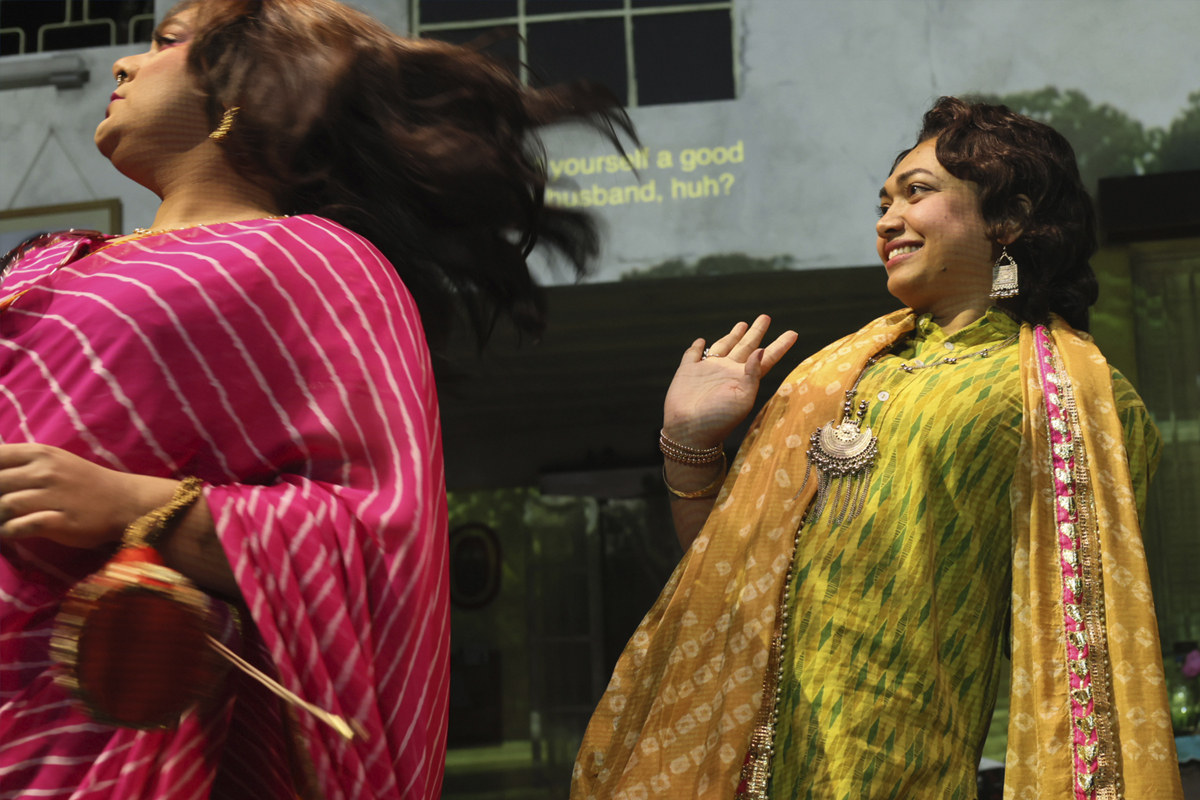
NaFis as Sebanti and Tashnuva Anan as Shou in Public Obscenities. Photo: Hollis King.
It’s not plot driving Public Obscenities so much as a nexus of poetic associations that bubble up through the surface of its unhurried, verité tempo, heightened by the occasional projected image or elevated sound effect. Similar to Annie Baker’s The Flick from a decade ago, scenes unfold at the pace of life, with casual silences, cross talk, or wordless business. Choton and Raheem’s documentary-in-progress focuses on queer locals vexed by “public obscenity” laws, vague statutes that enable police harassment. Their primary subject (sourced on Grindr) is the vivacious Shou (Tashnuva Anan, a double magnum of champagne in heels). Voguing and giggling with infectious glee, Shou gives the lie to the assumption that life for for openly gay, gender variant, or trans Bengalis is misery. Yes, they are subject to the petty tyrannies of police while cruising in parks, but Shou merrily recounts the time when one copper hassled her, a bulge visible in his pants.
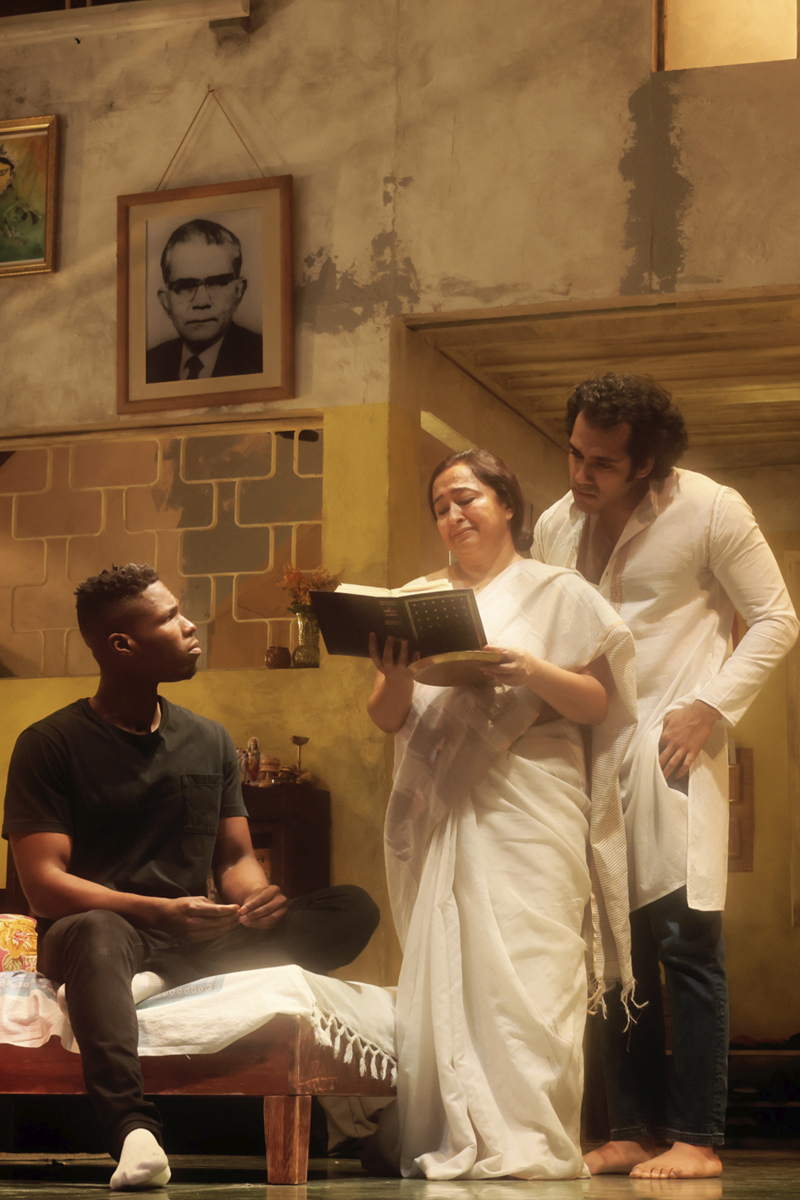
Jakeem Dante Powell as Raheem, Gargi Mukherjee as Pishimoni, and Abrar Haque as Choton in Public Obscenities. Photo: Hollis King.
In Chowdhury’s sympathetic critique of patriarchy, men may be problematic, but they’re also people with problems. Choton grew up in America painfully aware of his brown skin and now, as an adult, wrestles with sexual discomfort (literally related to his foreskin), which affects his intimacy with Raheem. A black-and-white photograph of Choton’s grandfather hangs totemically in the living room, tight, unsmiling lips passing mute judgment. On his first night, bedding down beside Raheem under a mosquito net, Choton breaks off a furtive wank over Grindr profiles when he notices “Dadu” glaring at him.
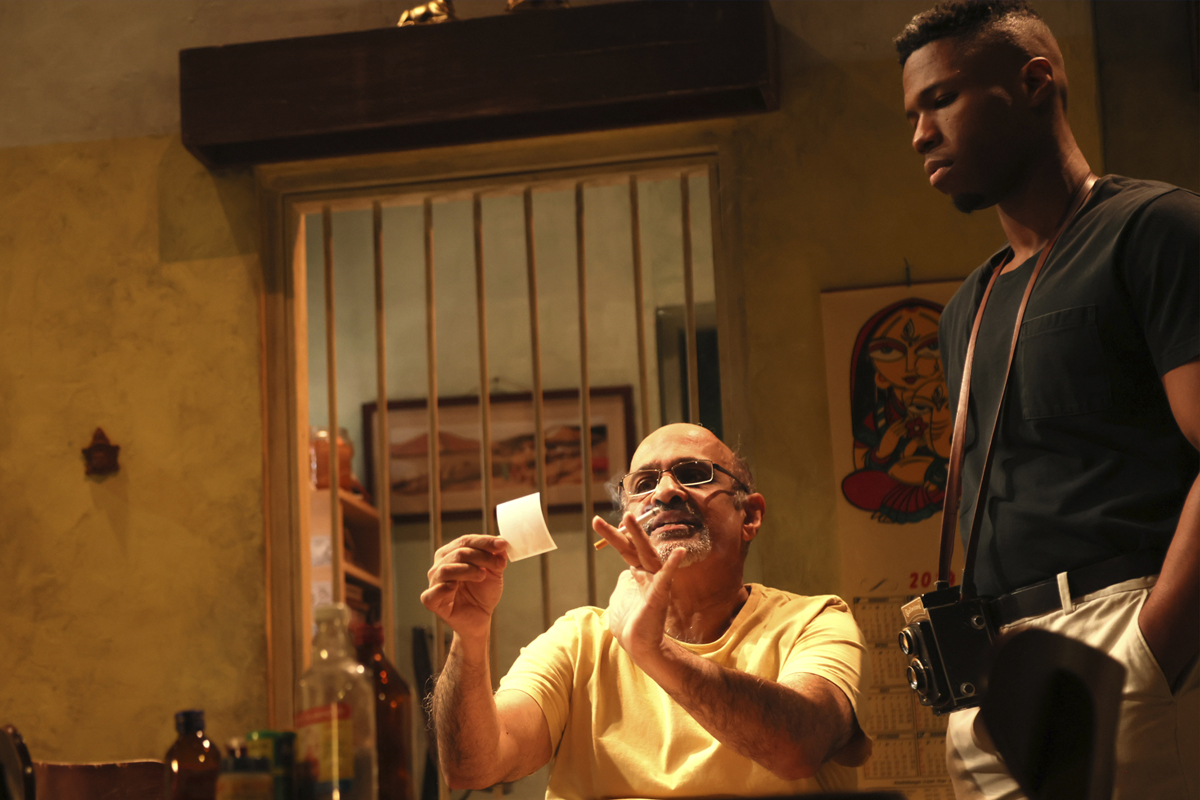
Debashis Roy Chowdhury as Pishe and Jakeem Dante Powell as Raheem in Public Obscenities. Photo: Hollis King.
One would assume the deceased elder would have strong objections to a gay grandson, but thirty-year-old film recovered from Dadu’s vintage Rolleicord camera, which Raheem has printed, suggests a different story. Each character peers at the photos—confused, bemused, or, like Pishimoni, inexplicably indignant—but the audience never hears a concrete description of their contents. Is that Dadu smiling? Naked? Why is he posing that way? A mystery obsures the details and provenance of these intimate images. When the gray-haired yet still-boyish house servant, Jitesh (Golam Sarwar Harun), examines them, his eyes light up with special knowledge—as an ice cream truck on the street twangles bars from Cats’ “Memory.”
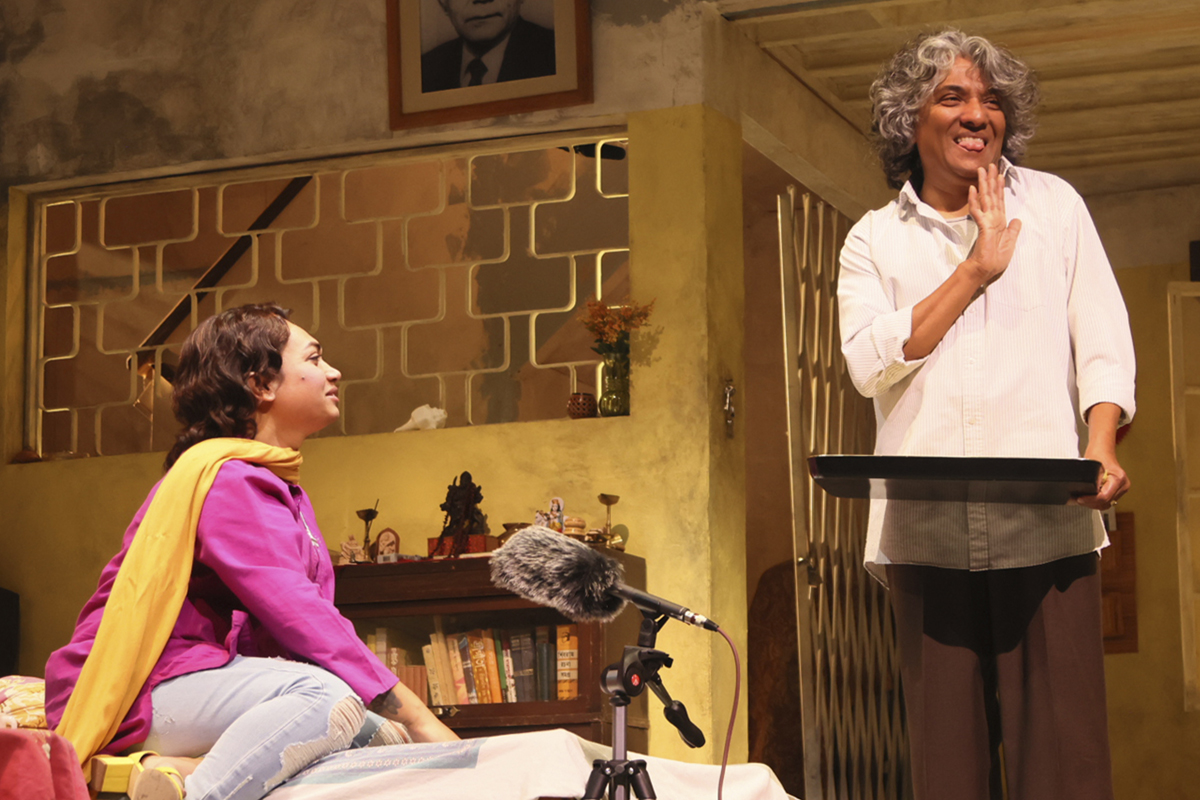
Tashnuva Anan as Shou and Golam Sarwar Harun as Jitesh in Public Obscenities. Photo: Hollis King.
Chowdhury’s tactical withholding of visual information exists in balance with another picture—a moving picture—described minutely by Pishe. Over the kitchen table, Pishe bonds with Raheem (a fellow film buff and admirer of Satyajit Ray, naturally) and relates a movie he once dreamed. In interviews, Chowdhury has said this shot-for-shot reverie his late uncle shared years ago was the genesis of the play. It’s a cryptic suite of scenes involving a space-shifting woman in a green sari and a madman catching flies and putting them in a basket on his head. The exact meaning of the dream is unclear; like much on the periphery of the play, we are invited to participate in interpretation.
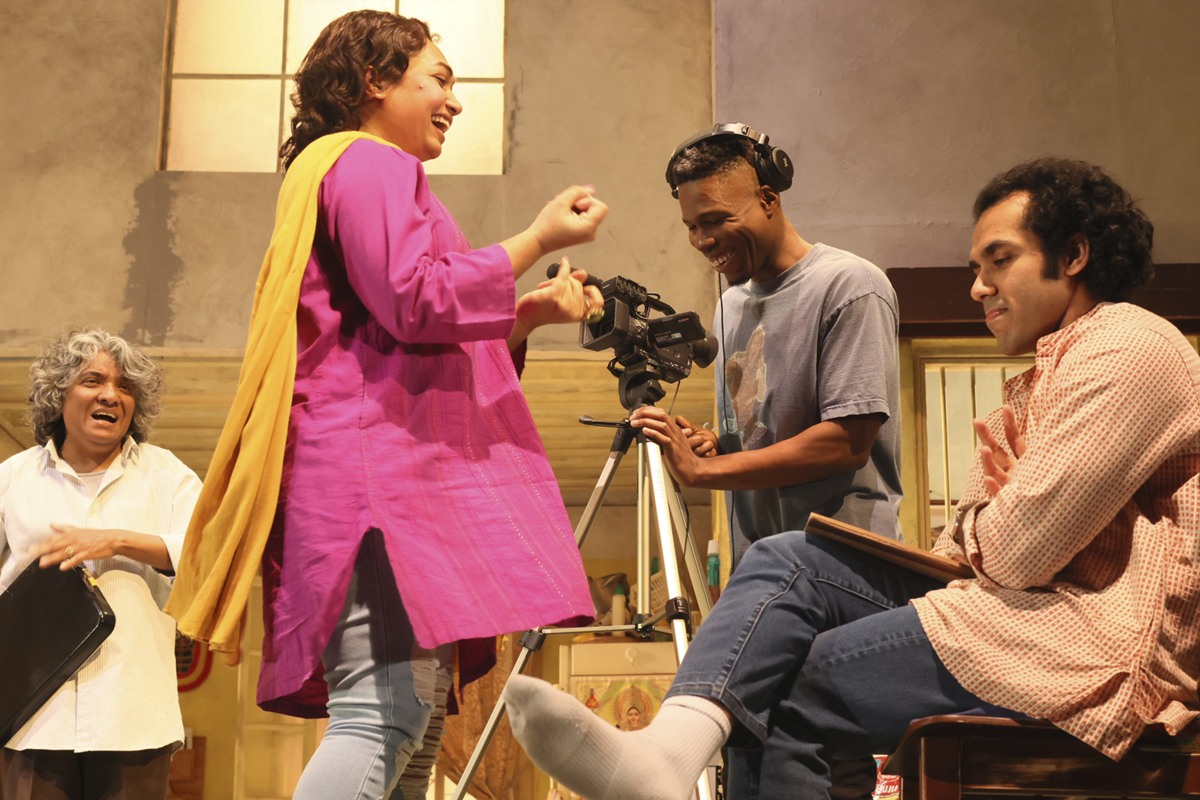
Golam Sarwar Harun as Jitesh, Tashnuva Anan as Shou, Jakeem Dante Powell as Raheem, and Abrar Haque as Choton in Public Obscenities. Photo: Hollis King.
In narrative and mise-en-scène, Public Obscenities is obsessed with filming, screens, and frames: both old photos salvaged from the past and video Choton flubs by not pressing “record.” Shou is driven into ecstasies at the thought of “starring” in a film—perhaps her ticket to America. Even when Choton, under the mosquito net, uses the light of his phone to locate a pestering insect, we’re watching a screen within a screen. In the play’s final moments, Jitesh is asked to take a family photo of Choton, Raheem, and Pishimoni. By this point we may have intuited that Jitesh was the man behind Dadu’s camera. The circle of image capture closes to a commotion of crows flapping and cawing, perhaps a sign that Dadu’s spirit has been released. Tei Blow’s surround-sound design immerses the audience in the sonic life of the streets outside: bicycle bells jangling, children laughing, a dog barking, a vendor hawking his wares.
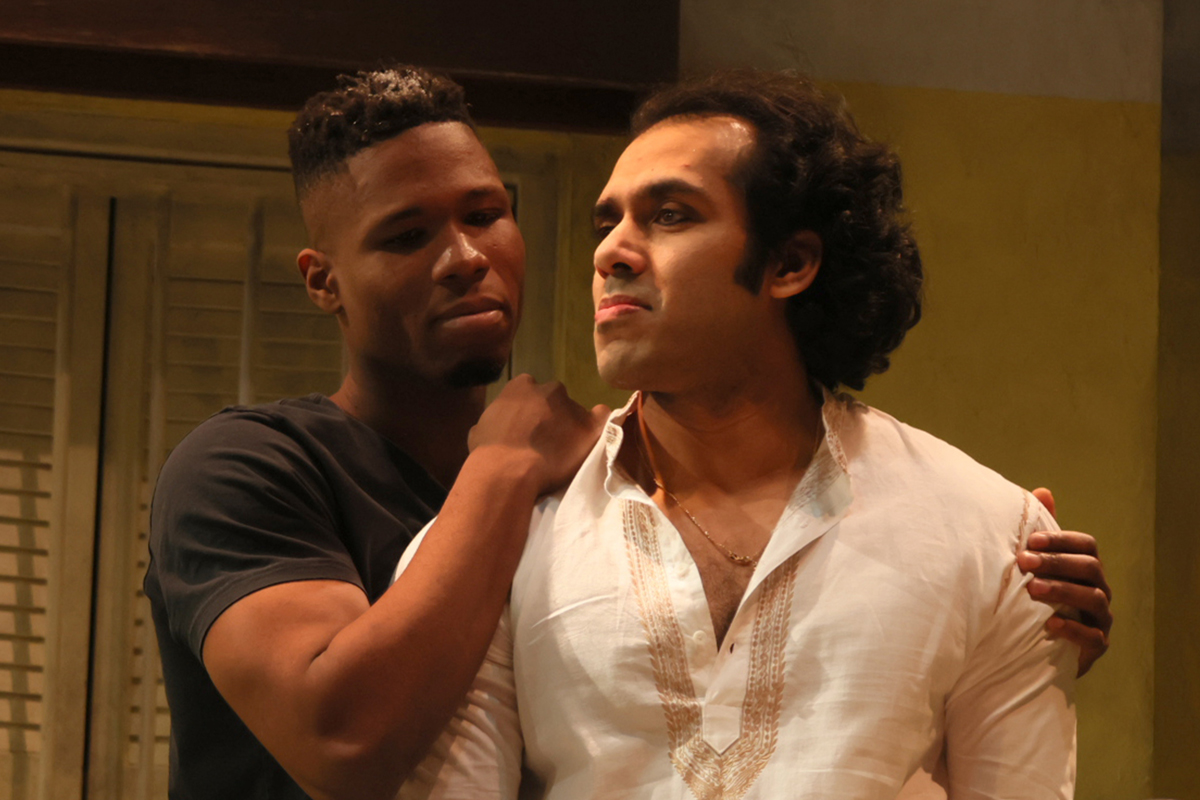
Jakeem Dante Powell as Raheem and Abrar Haque as Choton in Public Obscenities. Photo: Hollis King.
Every cast member is a vibrant presence, brimming with skill and charisma, but Haque accomplishes a particularly striking physical transformation over the play’s nourishing three hours. In early scenes, Choton’s posture is terrible; he’s forever cringing from insecurity and nerves, hunching over his phone or fidgeting at his laptop. Toward the end, as he disrobes and wraps a towel around his waist to take a shower, Choton has undergone a change. It’s something to do with Raheem’s love and patience and a sense that his grandfather had a private identity beyond the repressive taskmaster. Choton stands straight and proud, and Haque, a beautiful, muscular fellow, is an image to behold. Home he is, and not a jot homely.
David Cote is a theater critic, playwright, and librettist based in Manhattan. He reviews theater for Observer. His work has been produced in New York, Cincinnati, Chicago, and London.